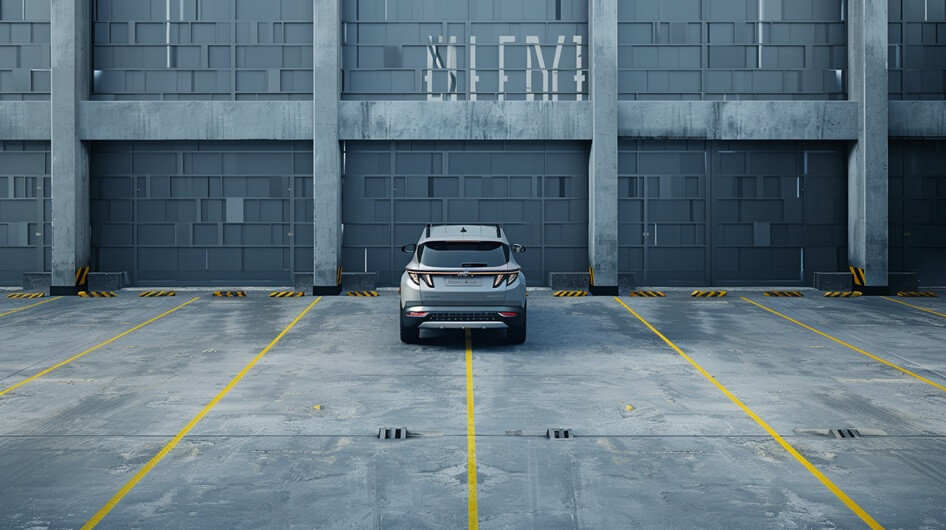
Battling the clock to stay on schedule, having spent an entire morning crawling through roadworks at the speed of a tectonic plate while repeatedly hitting silent on the relentless dispatch calls, you pull into the rest area in grave need of a well-earned rest.
This is no ordinary rest, though, as you badly need the bathroom and haven’t eaten since 5 am. To make an already urgent matter even more pressing, your DOT-enforced Hours of Service break is fast approaching and you could do without another violation, so there is that, too.
You really need this rest break, and both you and your bladder can’t wait to take it. But then disaster, as an increasingly common sight greets you on entering the parking area: a Hyundai Tucson with a ‘Happiness is Homemade’ bumper sticker parked unashamedly in the middle of the only remaining truck parking space.
Cursing both your luck and the faceless driver in equal measure, you are forced to endlessly circle the lot, praying to the parking gods for a space to become available, pronto.
Common Issue
If you are a reasonably experienced truck driver with a decade or so of service in your rearview, this has almost certainly happened to you. If you are a relatively new truck driver, be prepared for it to happen at some point. Either way, parking a regular vehicle in a space allocated for semi-truck parking is an infuriating, rude, arrogant, and selfish practice.
But is it really?
The truth is, parking a regular vehicle in a truck parking space is something of a gray area. Many truck drivers and car owners are unaware of the rules in this regard because some parking lots and rest areas allow it, and others don’t.
So, what are the actual rules, and can cars park at truck stops or not? Regardless of any rules that may or may not exist, should car drivers be more empathetic of truck drivers and respect their boundaries? Through this article, we shall attempt to unearth the facts, mixed with a few gentle opinions. Let’s get to it.
Can Cars Park at Truck Stops, Rest Areas, and Parking Lots?
Given the three main types of parking locations available to truckers, we shall approach each one with the same question, starting with rest areas.
Please be aware of one thing, however: this is by no means a complicated subject, but it is a nuanced one. With that in mind, we shall tackle the issue with a broad, general view.
Are Cars Allowed to Park at Truck Rest Areas?
The rules around whether cars can park at truck rest areas vary by location.
Generally speaking, truck rest areas are specifically designed to accommodate the needs of truck drivers who require ample space to park their large vehicles and take mandatory breaks. These areas are usually located along highways and interstates and are intended to provide truckers with a safe and convenient place to rest.
In some rest areas, you might find designated spaces for smaller vehicles, but these are often quite limited. While it might not be explicitly forbidden for cars to park in truck spaces at these rest areas, it is usually frowned upon (at best) or causes mild aggression (at worst). Essentially, truck drivers depend on these spaces to adhere to their strict driving schedules and regulations. Having them occupied by smaller vehicles can cause a great deal of inconvenience.
Given the national truck parking shortage, spaces are incredibly limited at the moment, so you would probably forgive the average truck driver for becoming a little irate should they find a rare empty spot taken up by a small vehicle in a large bay. To that end, it’s always a good idea for car drivers to look for clearly marked car parking spaces or use alternative rest areas designed for all types of vehicles.
Are Cars Allowed to Park in Truck Stops?
When it comes to truck stops, the situation can be a little different. Truck stops are commercial facilities that offer a variety of services for truck drivers, including fuel, food, showers, and parking, with the main purpose of catering to the needs of truckers. The parking spaces within them are designed to accommodate large trucks and not the metaphorical Hyundai Tucson we mentioned at the top of this article.
However, this is where it gets a little tricky. As a general rule, truck stops are often more lenient about allowing cars to park, especially if the car driver is a customer using the services offered. From their point of view, any business is good business, and if that means sacrificing a truck parking space so a family of five can spend eighty bucks on fried chicken and air freshener, so be it.
While there might not be a hard and fast rule against cars parking at truck stops, it is generally understood that truck parking spaces should be left available for trucks. So, while it might be possible to park a car at a truck stop, you might argue it is courteous and practical to avoid occupying a space meant for a truck.

Are Cars Allowed to Park in Private Truck Parking Lots?
Private truck parking lots, just like those managed by Truck Parking Club, are specifically designed for truck drivers to reserve and secure parking spaces. These lots provide a desperately needed service to truckers who need reliable, convenient parking options, often in areas where public truck parking is extremely scarce. The rules are typically far stricter in private truck parking lots, and cars are generally not allowed to park in spaces designated for trucks in the overwhelming majority of properties.
Private truck parking lots operate on a reservation system, meaning that truck drivers have a guaranteed spot to park their vehicles in advance. Allowing cars to occupy these reserved spaces would undermine the entire purpose of the lot and could lead to logistical issues for truck drivers who rely on these spaces.
Ultimatley, if you’re driving a car, it’s best to seek alternative parking arrangements and leave these specialized lots for their intended users. Truck drivers are under enough pressure at the moment without having to surrender spaces to car owners, most of whom have an abundance of parking options. Fair is fair, as they say.
Can Cars Park Overnight at Truck Stops?
So, what about sneaking into a truck parking area under cover of darkness? Will your typical car driver fare any better at night? To be honest, the answer is almost certainly no: the same principles apply to overnight parking.
As a general rule, truck stops, rest areas, and private parking lots are equally as busy (if not more busy) during overnight hours. Can cars park overnight at truck stops if they are empty? Maybe. Possibly. It depends on the location. Good luck finding an empty truck parking lot, though, regardless of the hour.
The same caveat applies, however, to some truck stops that may allow car parking if car owners commonly use the facilities to purchase food and drinks. It just depends on the truck stop’s policy.
Bottom Line
While the rules differ from location to location, parking a personal vehicle in a truck parking space is generally not advisable and often inconsiderate. While some rest areas and truck stops may allow it, the main purpose of these spaces is to accommodate large trucks and their drivers.
Private truck parking lots are strictly for truck use, ensuring that truck drivers have reliable, convenient, guaranteed parking options. If you are a truck driver and that sounds appealing to you, you might want to sign up for Truck Parking Club. We can solve your parking woes by offering thousands of private parking spaces all over America.
Simply browse for truck parking spots in your area of choice to secure your spot today. We didn’t just make Truck Parking convenient and affordable, we made it effortless, too.
The information published herein is for general informational purposes only. Truck Parking Club does not make any representations or warranties about the completeness, reliability, legality, and accuracy of this information. Any reliance placed on such material is strictly at the user’s own risk. Truck Parking Club shall not be responsible for any losses or damages incurred in connection with the information published herein.





